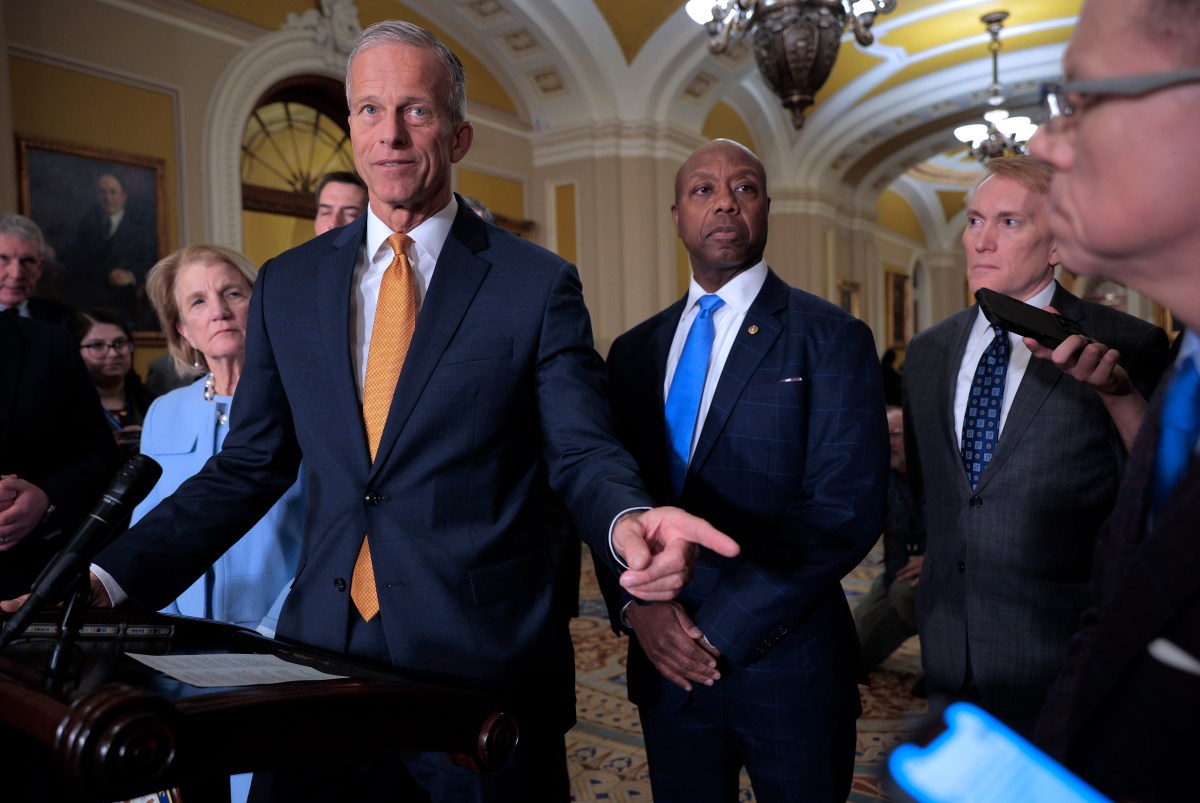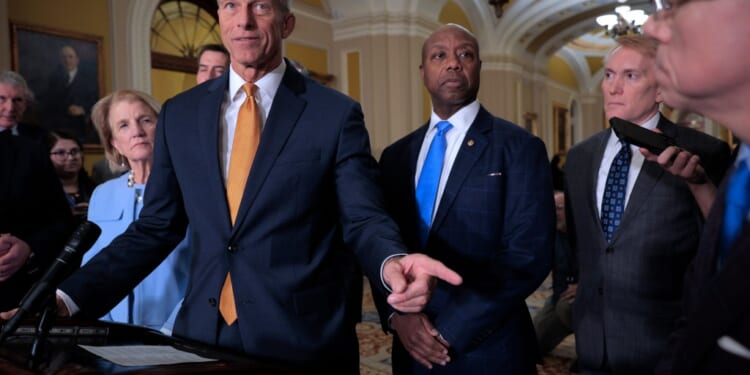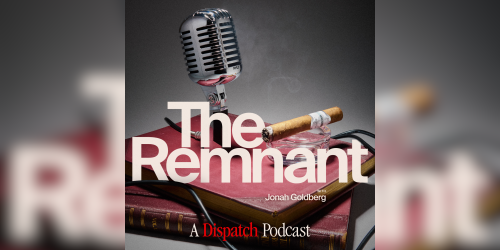You’re reading The Morning Dispatch, our flagship daily newsletter explaining all the news you need to know today in fewer than 10 minutes. Today’s newsletter has been unlocked by our sponsor. To unlock the full version every day, become a Dispatch member today.
Happy Thursday! Paris police admitted that Louvre security had some flaws when thieves broke in during daylight and stole more than $100 million in irreplaceable jewels earlier this month. Namely: A security camera permit expired in July without anyone noticing, some of the video security system is still analog, and a passing cyclist alerted police about the heist, not the Louvre’s alarms. So, yeah, not great!
Quick Hits: Today’s Top Stories
- A Tuesday police raid targeting a drug gang in the low-income settlements of Rio de Janeiro, Brazil, resulted in the deaths of at least 117 suspects and four policemen, officials said Wednesday, a significantly higher death count than the one initially reported by Brazilian police. Felipe Curi, the state police secretary, said more bodies had been uncovered in woods from which they were fighting against law enforcement. Roughly 50 bodies were also recovered by residents of the Penha and Complexo de Alemao favelas, who displayed them in Penha’s main square while shouting “massacre,” and “justice.” Officials also said 113 suspects from the Red Command gang had been arrested, with 90 rifles and more than a ton of drugs also recovered. Rio state Gov. Claudio Castro said Wednesday the operation had been a “success” in what he has characterized as a war against “narco-terrorists,” while insisting all civilians killed had been criminals.
- The death toll from Hurricane Melissa, currently making its way through the Caribbean, rose to more than 30 people as of this morning. Haitian officials said there had been 25 confirmed deaths there, while eight deaths had been reported in Jamaica and one in the Dominican Republic. A hurricane warning remains in effect for parts of Cuba, the Bahamas, and Bermuda. Winds reached 100 miles per hour, with officials warning that a storm surge of 4 to 7 feet is possible for parts of Bermuda. Jamaican Prime Minister Andrew Holness declared the country a disaster area on Wednesday, after Melissa made landfall on Tuesday as the strongest storm in the island’s history.
- The U.S. Army announced Tuesday that troops from the 101st Airborne Division would not be replaced after their scheduled withdrawal from Romania, Germany, and Poland, raising alarms among supporters of U.S. engagement with NATO. According to the Army’s press release, the departure of the 101st’s 2nd Infantry Brigade Combat Team, comprising roughly 700 soldiers, was “not an American withdrawal from Europe or a signal of lessened commitment to NATO and Article 5,” but a “positive sign of increased European capability and responsibility.” According to Romanian officials, about 1,000 U.S. troops will remain in the country. The Republican chairmen of the House and Senate foreign affairs committees, Rep. Mike Rogers of Alabama and Sen. Roger Wicker of Mississippi, issued a joint statement criticizing the move. “This decision also sends the wrong signal to Russia at the very moment President Trump is applying pressure to force Vladimir Putin to come to the table to achieve a lasting peace in Ukraine,” they said, noting that the White House had not consulted Congress.
- Videos circulating online and satellite imaging confirmed reports of widespread atrocities in the Sudanese city of El Fasher, which was taken by the Rapid Support Forces (RSF) rebel group over the weekend. Satellite images show pools of blood and piles of bodies around the city, and videos show alleged RSF forces—which include child soldiers—murdering prisoners in cold blood. Government-aligned forces who defended the city during an 18-month siege, as well as experts from the Yale School of Public Health Humanitarian Research Lab, say that RSF forces are attempting to ethnically cleanse non-Arab populations from the city. Tedros Adhanom Ghebreyesus, the director of the World Health Organization, said Tuesday that his organization had received reports of 460 people being murdered at a maternity hospital in the city. The total casualties from the ongoing sack are unknown but most likely run into the thousands.
- The Federal Reserve’s Open Markets Committee cut interest rates by a quarter of a percentage point on Wednesday to a range of 3.75 percent to 4 percent. The vote by the 12-person committee included two dissents. Governor Stephen Miran, who was appointed to the Federal Reserve by U.S. President Donald Trump in September, dissented in favor of a half-percentage-point cut, his second consecutive dissent in favor of looser economic policy. Kansas City Fed President Jeffrey Schmid also dissented, but preferred that the Fed hold rates steady. During his press conference after the meeting, Federal Reserve Chair Jerome Powell told investors not to count on another rate cut at the Fed’s next meeting.
Is it true the Pentagon is cracking down on free speech?
Journalists covering national security are pushing back on new Pentagon rules that could bar them from briefings if they publish “unauthorized” information. Major outlets, from The New York Times on the left to Fox News on the right, refused to sign the pledge. What started as a dispute over access has evolved into a fight over the truth itself. Freespoke helps you see every perspective regarding free speech concerns like this unprecedented clash between the press and the Pentagon.
Pay Later

Since the government shutdown started on October 1, the Senate is 0 for 13 in its efforts to pass legislation to temporarily fund the government.
The second-longest shutdown (as of now) in U.S. history will end when Congress passes a funding bill and President Donald Trump signs it into law. But agreeing to appropriations terms is no easy task. Congressional Republicans want a clean, continuing resolution to temporarily fund the government at current spending levels, while Democrats have demanded the extension of health care subsidies.
Meanwhile, more than 1 million federal employees are either furloughed or not currently getting paid for their work, the government may soon be unable to pay federal troops, flight delays are becoming more frequent due to air traffic controller shortages, and food stamp benefits are on the brink of drying up.
“You’re damned if you do and damned if you don’t,” Democratic Sen. John Hickenlooper of Colorado said of Democrats’ choices when voting on Republican-backed bills to temporarily fund the government. “I can’t remember a situation where I felt there were less palatable choices.”
How did we get here? Democrats have remained adamant about tying a federal funding bill to health care proposals, and Senate Democrats have backed a short-term funding bill introduced by Sen. Patty Murray of Washington on September 18 that would permanently extend health care tax credits under the Affordable Care Act and repeal new Medicaid provisions enacted in July.
While both Republican Senate Majority Leader John Thune and GOP House Speaker Mike Johnson say they have no qualms about discussing health care reform with Democrats after the shutdown ends, they maintain they would support only a “clean” continuing resolution bill to fund the government temporarily. Specifically, the bill would fund the government through November 21, appropriating funds to agencies for the prorated amount awarded in fiscal year 2025.
To pass any funding bill, the Senate needs 60 votes to invoke cloture and break the filibuster, not a simple majority. And, while GOP Sen. Bernie Moreno of Ohio has already called for killing the filibuster to end the shutdown, Democrats are now lining up to back the rule. “We have to follow the current rules,” Democratic Sen. Elizabeth Warren told TMD on October 17. “ That’s just how it is.” Nor does nixing the filibuster appear to be the aim of GOP Senate leadership, with Thune stating earlier this month that he will continue supporting it.
The House passed the Republican-backed bill on September 19 by a 217-212 vote, but it failed in the Senate later that day. Three senators—Democratic Sens. John Fetterman of Pennsylvania and Catherine Cortez Masto of Nevada, plus independent Angus King of Maine, —have joined Republicans to advance the bill. Still, on Tuesday, the Senate failed to pass the bill for the 13th time since the first vote on September 19.
Stalemates and gridlock may be everyday business for Congress, but for many federal workers—air traffic controllers, Capitol Police, staffers across federal agencies, and even some court employees—that means no pay. According to estimates from the nonpartisan Congressional Budget Office released on Wednesday, 650,000 federal workers were expected to be furloughed during the shutdown, with another 600,000 government employees expected to work with no pay for the time being.
A total of 63,000 air traffic controllers and Transportation Security Administration agents are among the federal workers expected to work without compensation for the time being. Transportation Secretary Sean Duffy has warned that this is unsustainable. “If we don’t have enough controllers,” he told Fox News on Tuesday, “we will slow down the airspace, we will shut down flights.”
About 7,000 flights nationwide were delayed on Monday, nearly one-sixth of the 45,000 average daily flights that the Federal Aviation Administration (FAA) oversees. The FAA issued brief ground delays this week at Los Angeles International Airport and Dallas-Fort Worth International Airport, temporarily halting flights departing from two of the country’s busiest travel hubs.
And the problems don’t stop there. Earlier in October, Trump reallocated $8 billion to pay military service members, but Treasury Secretary Scott Bessent warned on Sunday that those funds are drying up and troops will likely miss paychecks beginning November 15. Where did that $8 billion come from? Politico reported on October 11, citing two unnamed “people familiar with the plan,” that the administration was reallocating funds from other accounts within the Department of Defense (DOD), including military research and development programs.
“I thought his first payment of the troops was lawful because it used funds that were unallocated,” Democratic Sen. Tim Kaine told TMD, adding that they “were funds [allocated] within the DOD.” But, as Zachary Price, a UC Law San Francisco professor, noted, “You still need some authority to move the money between accounts. So the question would be whether that exists.”
On October 23, Trump announced that the government received more funds to pay troops through a $130 million donation from an unnamed “patriot” and “friend of mine.” The New York Times later identified the donor as billionaire Timothy Mellon, a major donor to Trump’s presidential campaigns and other Republican candidates, and grandson to financier and former Treasury Secretary Andrew Mellon. But can the Pentagon accept this gift? And if so, would it need to be appropriated by Congress?
“It’s kind of central to the constitutional design that Congress gets to determine what resources are available for military,” Price told TMD. “And it would be a real problem if you could get around that despite getting private contributions.”
Allocating the donation to military pay would be “illegal and unconstitutional,” according to Georgetown University law professor David Super. “If these funds were donated to the United States, then they are public funds, and the Constitution says that no public funds shall be paid except pursuant to an appropriation by Congress,” he added. While federal laws provide legal ways to give such a gift to the government, the funds still “can’t be spent without congressional authority,” he said.
Meanwhile, Supplemental Nutrition Assistance Program (SNAP) benefits are set to pause on November 1. Congress has, in previous appropriations legislation, passed $3 billion annually in SNAP contingency funds that expire after two years, leaving $6 billion in the contingency fund—and a Department of Agriculture (USDA) memo, last updated on September 30, said that the administration planned to use those contingency funds to keep SNAP afloat. But on October 24, the administration removed the memo from its website, and the USDA stated that the SNAP contingency fund is only to be used to address pressing emergencies, such as natural disasters. That same day, CNN obtained a USDA memo stating that the administration could not reallocate funds to pay for SNAP through November, and that its hands were tied unless Congress acted. In a separate memo obtained by Axios, the USDA noted that the federal government would not reimburse states that choose to cover the costs of continuing benefits for SNAP recipients.
During the 2018-19 government shutdown, the first Trump administration approved and issued SNAP contingency funds to continue benefits.
Though Trump initially appeared to offer reassurance when asked about SNAP—telling reporters on October 24, “Yeah, everybody is going to be in good shape, yep”—Johnson on Monday stated that the executive branch’s only legal means of funding the continuation of SNAP “pulls away immediately from school meals and infant formula.” Thune told reporters on Tuesday that if Democrats want “to pay SNAP recipients, open the government.”
On Tuesday, a group of 25 states plus Washington, D.C., sued the Trump administration over what the lawsuit described as the USDA’s legal obligation to disperse SNAP benefits. In Super’s view, the most pressing matter for the plaintiffs is the question of how quickly a hearing can be scheduled or an appeal heard, explaining that the case is strong on the merits.
“The law on this is so clear that it wouldn’t surprise me if the administration backs down,” Super said. “I just don’t know what their legal arguments could possibly be.”
All this leaves both parties pressured to pass a stopgap funding bill. But the House-passed, GOP-endorsed funding bill is set to expire on November 21, putting the onus on Congress to supposedly deliver a full appropriations bill less than three weeks after ending the shutdown.
For that reason, Molly Reynolds, interim vice president and director of governance studies at the Brookings Institution, explained that the expiration deadline will likely be pushed back.
“Logistically, they’re going to need more time than that to actually make progress on the underlying appropriations,” she told TMD. “So, I expect at the very least that whatever [continuing resolution] they enact to reopen the government is going to have a later end date than November 21.”
Today’s Must-Read
Is federal intervention necessary to restore law and order in American cities? In some ways, yes; in others, no. I don’t mean to get all “lawyery” about it, but the question is somewhat loaded. After all, what do we mean by “necessary”? Do I think cities could maintain adequate levels of public safety without a muscular federal law enforcement presence? Yes. Have many cities failed to live up to their potential in significant ways? Also yes. Will those cities cease to exist, or devolve into completely lawless Thunderdomes, without federal help? Almost certainly not. So, for the purposes of this exchange, I’m going to take the word “necessary” to mean that the more aggressive posture recently taken in some jurisdictions—like Washington, D.C.—by the federal arm of the law can add real value on the public safety front.
President Donald Trump claims many major American cities are criminal hellscapes so unsafe that only by deploying uniformed and armed National Guard personnel—or even U.S. Marines—can we solve the problem. Is his reading accurate? I spent 11 years in the National Guard and Army Reserve and was part of a group of Missouri Guard personnel called up to assist with post-tornado security and anti-looting operations in my hometown of Springfield, Missouri, in April 1983. As such, I have some thoughts about how Guardsmen should (and should not) be used during or after actual emergencies. Let’s begin with the president’s premise and then examine his proposed solution. Simply stated there was and is no “crime emergency” in any major American city targeted by the Trump administration for National Guard deployments.
Toeing the Company Line
We, Sharpie
It takes a global supply chain to make a permanent marker, regardless of where it’s assembled.
In Other News
- Following a meeting with Chinese President Xi Jinping, President Donald Trump announced he will cut tariffs on China and postpone export controls on chips in exchange for Beijing’s commitment to buy U.S. soybeans and energy, allow exports on rare earth minerals, and crack down on fentanyl. China made its first 2025 purchase of U.S. soybeans on Wednesday.
- Defense Secretary Pete Hegseth announced the U.S. carried out another strike on a boat in international waters in the Eastern Pacific, killing four aboard.
- The Congressional Budget Office estimates the U.S. economy will lose at least $7 billion due to the government shutdown, rising to $14 billion if it continues through November.
- Two men were sentenced to 25 years in prison by a New York judge for plotting to assassinate Iranian dissident Masih Alinejad at the behest of the Iranian government.
- Sen. Catherine Cortez Masto, a Democrat from Nevada, and Sen. Rand Paul, a Republican from Kentucky, introduced a bill on Wednesday that would bar the White House from raising additional tariffs on imports of coffee from countries with which the U.S. has normal trade relations.
- Trump wrote on Truth Social Wednesday night that he has ordered the Department of Defense to “immediately” start nuclear weapons testing. The last U.S. nuclear test was in 1992. It’s unclear whether Trump means testing warheads or their delivery systems, like missiles.
- The Israel Defense Forces said it had launched a criminal probe into the leak of a video from the Sde Teiman detention center, which allegedly showed five IDF soldiers beating and sodomizing a Palestinian detainee.
- International Atomic Energy Agency Director General Rafael Grossi said Wednesday that Iran was not actively enriching uranium, but new movements had been detected near its nuclear sites.
- Polish fighter jets intercepted a Russian reconnaissance plane making a flight over the Baltic Sea on Wednesday.
- Israeli officials said that Hamas had faked the discovery of the body of an Israeli citizen, whose remains Israel had partially recovered in 2023, by placing the remains in an open pit, covering it, and then pretending to uncover it in front of the Red Cross.
- Five more people were arrested in the investigation of the Louvre theft. The stolen jewels have yet to be recovered.
- France made consent part of its definition of sexual assault on Wednesday, following the Gisèle Pelicot trial.
- Chipmaker Nvidia is now worth $5 trillion, becoming the first company to reach that valuation.
- Electric vehicles were left off the list of China’s strategic industries as planning for the next five-year plan gets underway, a sign that subsidies for the sector will end.
- Character AI—an app that allows users to message with chatbot personas—will bar minors from using its service.
- Lockheed Martin announced the successful test of a “quiet” supersonic jet on Wednesday.
- Paramount Skydance announced it will lay off roughly 2,000 employees following its merger in July.
- “Binance Boosted Trump Family’s Crypto Company Ahead of Pardon for Its Billionaire Founder” (Wall Street Journal)
- Noah Smith has some ideas for Sanae Takaichi on how to improve Japan’s economy (Noahpinion)
- Larissa MacFarquhar writes about the spectrum of mental imagery and how the ability—or inability—to visualize impacts our lives. (The New Yorker)
- Eli Pariser on what was discussed at a recent influential AI conference (Second Thoughts)
Semafor: British Newspaper Spoke to the Wrong DeBlasio, Not an ‘Imposter’
The man at the heart of a high-stakes mix-up that rippled through global political journalism in the final days of the New York mayoral campaign was neither “falsely claiming” to be former Mayor Bill de Blasio — as the Times of London suggested — nor, as The New York Times wrote, a “de Blasio impersonator.”
He is, instead, a 59-year-old Long Island wine importer named Bill DeBlasio, who merely responded to an email from a journalist seeking his views on Democrat Zohran Mamdani’s policies.
“I’m Bill DeBlasio. I’ve always been Bill DeBlasio,” DeBlasio said in an interview conducted Wednesday evening through his Ring doorbell …
Washington Times: Dutch Voters Navigate Massive Ballot With 27 Parties and 1,166 Candidates
Behind the Scenes
Today’s “Behind The Scenes” is about how TMD handles President Donald Trump’s claims about running for a third term. On Tuesday’s TMD, Chris wrote:
I like how “President refuses to rule out total destruction of the Constitution” gets a small blurb at the bottom of the newsletter.
Meanwhile, C8H10N4O2 wrote:
I am vexed by this kind of reporting. A third term is impossible/unconstitutional on its face, full stop. Why do news outlets even ask this question in the first place, and when DJT wastes air talking about it, why do news outlets bother to even report it? … Is there a hole in the Constitution on this matter? If not, why do the media give this idea any oxygen?
TMD Editor Ross Anderson: This has been an intractable struggle for journalists going on a decade now: whether to take Trump “seriously or literally.”
A sitting U.S. president responding to a question about seeking a third term with anything other than “Of course not, that would be unconstitutional” is unquestionably newsworthy. The 22nd Amendment explicitly states that “No person shall be elected to the office of the President more than twice,” and Trump in recent months has not only refused to rule out the possibility but showcased “Trump 2028” merchandise in the Oval Office.
But Trump says a lot of things that he does not do. If we were to blow up our plans for the newsletter every single time the president posts something … unique … on social media, or tells reporters something unusual or unexpected, we would cover nothing else.
Trump, by his nature, prefers to keep audiences guessing—and his options open. Several times a week, a reporter will ask him whether he’s going to do something unprecedented or outside of traditional norms, and almost without fail, he will respond with something along the lines of, “That’s a very interesting idea. I haven’t thought about that.”
We could—factually—run a headline the following day that reads, “Trump refuses to rule out [unprecedented action].” Many outlets do. But in most cases, such a headline would not accurately capture the real sentiment of the exchange.
The challenge—and one that we have not always navigated successfully—is determining when typical Trumpian bluster (or “trolling”) is morphing into something more sinister. On November 9, 2020, for example, the Washington Post published a now-infamous quote from an anonymous “senior Republican official” about why Republicans weren’t doing more to shoot down Trump’s election-fraud claims: “What is the downside for humoring him for this little bit of time? No one seriously thinks the results will change.”
In that and many other instances over the years, what may have started as a “joke” or “blowing off steam” quickly became anything but. Nick Catoggio wrote a great Boiling Frogs on the phenomenon earlier this year, and another good newsletter on how to think about “Trump 2028” in particular earlier this week.
Either way, House Speaker Mike Johnson confirmed the obvious on Tuesday, stating that the Constitution bars Trump from a third term, and Trump himself conceded Wednesday that, although it’s “too bad,” he’s “not allowed to run” again. We’ll continue to monitor this story—and keep you updated on any comments we think are newsworthy in the “In Other News” section—while reserving more full-fledged stories for reporting on things the president and his team are actually doing.
If Trump files for reelection with the Federal Election Commission, or if no Republican candidates have launched campaigns for president by mid-2027, we will be all over it.
To read TMD editor Ross Anderson’s response to the question—or to submit one of your own—become a member today.
Let Us Know
Have any thoughts or questions about today’s newsletter? Drop us a note in the comments or by emailing us at tmd.questions@thedispatch.com. We read every submission, and your message could be featured in an upcoming “Behind the Scenes” segment.
Have any thoughts or questions about today’s newsletter? Become a member to unlock commenting privileges and access to a members-only email address. We read every submission, and answer questions in the following edition of TMD.




























